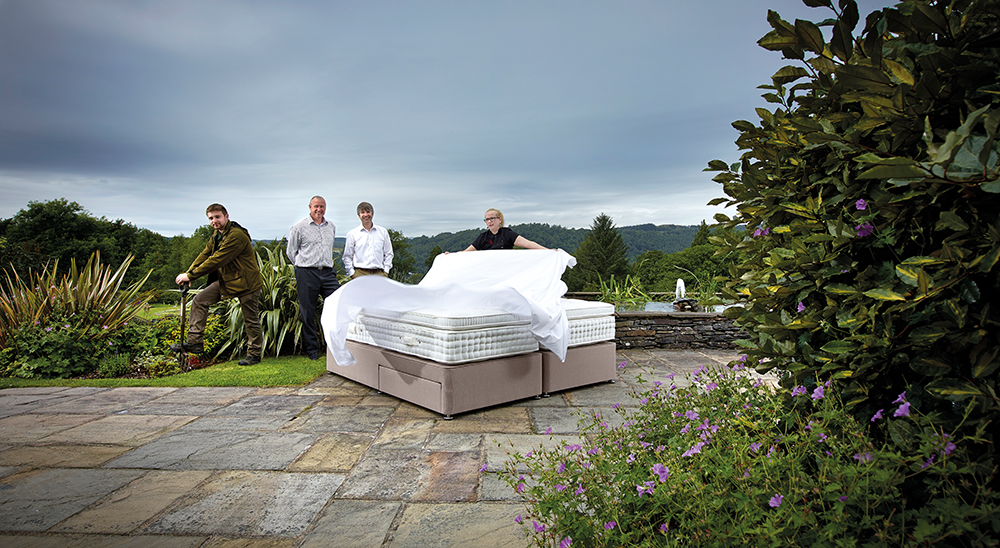Harrison Spinks has, deservedly, carved a reputation as one of Britain’s leading bed makers, and the company’s recent and much awaited entry into the contract bed market is only expected to build upon this history of success.
Hospitality Interiors’ Gemma Ralph visited the company’s headquarters in Leeds to find out more about the new contracts division, and to discover what Harrison Spinks’ unwavering thirst for innovation might herald for the hospitality sector.
By way of brief introduction, this family-owned business in fact dates back to 1840, when fillings manufacturer William Rhodes formed ‘The Bedding House of Rhodes’. This later evolved into Somnus bedding, which was to become a leading force in the industry for over half a century.
175 years and several transitions later, the business is run by the Spinks family – now the sixth generation to take up the mantle – and incorporates luxury bed brands, Harrison, Somnus and Spink & Edgar, in addition to the contract division, Harrison Spinks Components, Harrison Spinks Baby, and Spink & Edgar Upholstery.
While Harrison Spinks’ rich heritage and sense of tradition are key to its brand identity, pushing the boundaries of bed design in this competitive sector is key to its success.
The company’s commitment to engineering cutting-edge products is driven by Harrison Spinks’ MD and self-confessed ‘spring geek’, Simon Spinks. 15 years ago, when Simon devised the Revolution® ‘spring within a spring’ system, he set in motion a revolutionary approach to the manufacture of pocket spring mattresses.
Earning Millennium product status and helping to secure The Queen’s Award for Enterprise in innovation, this patented technology entails the insertion of a small spring into a standard pocket spring, thus producing additional tension to ensure even weight distribution, the elimination of pressure points, and an enhanced sleeping experience.
Following on from the commercial success of this invention – and proof that the company doesn’t rest on its laurels for one moment – attention has now been turned to developing high density pocket spring systems, manufactured on self-designed and patented spring machines.
Crucially, this has removed the company’s reliance on petro-chemically derived foam and polyester fibre fillings, allowing instead for the introduction of sustainable natural fibre production.
It is clear when meeting the team and walking the factory floor that there is a great deal of genuine excitement and pride surrounding these innovations. Indeed, as all of Harrison Spinks’ mattresses are made by hand using time-honoured techniques, Harrison Spinks employees are deeply invested in the quality of the products from start to finish.
The identity and authenticity of Harrison Spinks’ mattresses begins to be shaped long before they reach the factory floor, however. One of the company’s most exciting developments in recent times has been the purchase of a Grade II Listed farm, situated just 20 miles away from the factory.
Set in 300 acres of scenic Yorkshire pasture, this haven of arable land, woodland and protected hedgerows provides Harrison Spinks with a unique opportunity to grow a dynamic collection of high quality fillings for its mattresses.
As farm manager Gary McPartland explained whilst we toured the surrounding fields, considerable investment has been made in planting environmentally-friendly crops, namely hemp and flax. In fact, 150 acres of hemp are grown on the farm – with an additional 250 acres coming from local farmers – where it is all processed on-site ready for use as filling material.
The benefits of hemp are diverse. Considered to be a carbon-negative raw material – requiring no pesticides or herbicides to grow – hemp also possesses impressive anti-bacterial properties, and is attracting a great deal of attention from the healthcare industry as a result.
For Harrison Spinks, there are three principal uses for the material. Hemp fibre (the resilient outer layer of the plant) is ideally suited for use in mattresses as it helps to regulate temperature, while the woody centre of the plant, or ‘hemp shiv’, is sold on as a building product or for animal bedding. Lastly, hemp dust is pelletised and burnt in the biomass boiler to heat the farm’s manor house, as well as being ploughed back into the fields.
Aside from its crops, the farm is also home to around X sheep. Selected for their thick, strong wool, the farm’s flock of Suffolk, Zwartbles and Texel sheep provides the company with pure new wool – its most desirable form.
Expertly blended with cotton, fine cashmere and mohair at the factory in Leeds, these materials not only represent a level of self sufficiency and integrity that few businesses can lay claim to, but they also give provenance to Harrison Spinks’ Contract Collection.
Aside from this unique backstory, a key advantage of the Harrison Spinks’ Contract Collection is the option to create bespoke designs. Each bed can be tailored to individual requirements, from its size and firmness, accompanied by a multitude of fabric and headboard options.
Indeed, Harrison Spinks was recently commissioned to develop an exclusive range of bespoke beds for Wildsmith hotels – each mattress featuring 10,000 Sensa iP pocket springs, and with fillings including hemp, Herdwick wool and tree silk.
Successful supply partnerships have also been formed with hotels such as Dart Marina in Devon, Hazelwood Castle near York as well as further afield, supplying Mark Warner Holidays in their ski resorts in Miribel, to name but a few.
Combining high quality, sustainable materials straight from the fields, unrivalled spring technology and the unique expertise of a skilled team of craftsmen, Harrison Spinks’ contract collection has all the ingredients to succeed – and given the company’s history, we’re sure it will.



